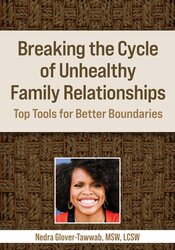

For our adult clients with difficult parents, there’s a constant struggle between maintaining connection and protecting themselves from getting hurt.
Especially when there have been years of parental abuse, neglect, addiction, or mental illness, it's easy for therapy to get stuck on processing the past...
...and never get to the specific steps our clients can take NOW to feel better.
The key to healthier relationships is teaching our clients how to establish boundaries.
And now, you can learn top tools for better boundaries directly from relationship expert and acclaimed clinician and author, Nedra Glover Tawwab, LCSW.
She’ll give you practical, easy-to-implement interventions that you can use right away to help your clients set better boundaries and transform their interactions with difficulty family members.
PLUS, don’t miss in-depth conversations between Nedra and key experts in the field, including Joshua Coleman, PhD, Karl Pillemer, PhD, and more!
Watch this is a rare opportunity and hear from four leading experts discuss the most crucial clinical topics!
Planning Committee Disclosure - No relevant relationships
All members of the PESI, Inc. planning committee have provided disclosures of financial relationships with ineligible organizations and any relevant non-financial relationships prior to planning content for this activity. None of the committee members had relevant financial relationships with ineligible companies or other potentially biasing relationships to disclose to learners. For speaker disclosures, please see the faculty biography.
PESI Australia, in collaboration with PESI in the USA, offers quality online continuing professional development events from the leaders in the field at a standard recognized by professional associations including psychology, social work, occupational therapy, alcohol and drug professionals, counselling and psychotherapy. On completion of the training, a Professional Development Certificate is issued after the individual has answered and submitted a quiz and course evaluation. This program is worth 6.5 hours CPD for points calculation by your association.
| File type | File name | Number of pages | |
|---|---|---|---|
| Manual - Breaking the Cycle of Unhealthy Family Relationships (4.5 MB) | Available after Purchase | ||
| Manual - Breaking the Cycle of Unhealthy Family Relationships - French (4.5 MB) | Available after Purchase | ||
| Manual - Breaking the Cycle of Unhealthy Family Relationships - Italian (4.5 MB) | Available after Purchase | ||
| Manual - Breaking the Cycle of Unhealthy Family Relationships - German (4.5 MB) | Available after Purchase | ||
| Manual - Breaking the Cycle of Unhealthy Family Relationships - Spanish (4.5 MB) | Available after Purchase |

Nedra Glover Tawwab, MSW, LCSW, is a licensed therapist and the author of Set Boundaries, Find Peace: A Guide to Reclaiming Yourself, an instant New York Times bestseller translated into over 35 languages worldwide. In addition, she has authored seven other books, including Drama Free: A Guide to Managing Unhealthy Family Relationships and, most recently, The Balancing Act: Creating Healthy Dependence and Connection Without Losing Yourself. A sought-after relationship expert, she has practiced relationship therapy for almost 20 years. With more than 2.5 million followers across her social media platforms, Tawwab has appeared as an expert on Red Table Talk, The Breakfast Club, Good Morning America, and CBS Mornings, to name a few. Her work has been highlighted in The New York Times, The Guardian, and Vice and has appeared on numerous podcasts including The School of Greatness, We Can Do Hard Things, and 10% Happier.
Speaker Disclosures:
Financial: Nedra Glover Tawwab maintains a private practice and receives royalties as a published author. She receives a speaking honorarium, recording, and book royalties from Psychotherapy Networker and PESI, Inc. She has no relevant financial relationships with ineligible organizations.
Non-financial: Nedra Glover Tawwab has no relevant non-financial relationships.
Part 1: Understanding Boundaries in Parent-Child Relationships
What are boundaries (hint: they aren't cutting someone off)
The six types of boundaries
Benefits of healthy boundaries and impact of poor boundaries
Common boundary issues in parent-child relationships and the family dynamics that lead to them
Part 2: Assessing boundary issues with your clients
How to tell if your client is struggling with boundaries
The signs of poor boundaries that therapists frequently miss
Determining your client’s readiness for change and how to increase motivation when it isn’t there
Part 3: A Step-by-step guide to teaching boundaries and becoming a boundary-centered practitioner
Eight steps to setting healthy boundaries
Communication strategies your clients need for setting (and enforcing!) a healthy boundary
How to help your clients best respond when new boundaries are tested
Part 4: Conversations with Experts
Interview 1 – Lindsay Gibson, PsyD
Interview 2 – Joshua Coleman, PhD
Interview 3 – Karl Pillemer, PhD
Part 5: Clinical Considerations
Therapists need boundaries too: How to set professional boundaries
Limitations of the research and potential risks
Please wait ...